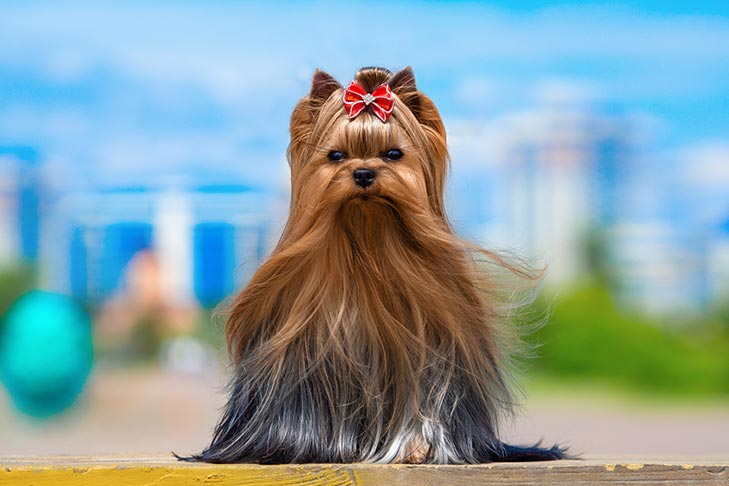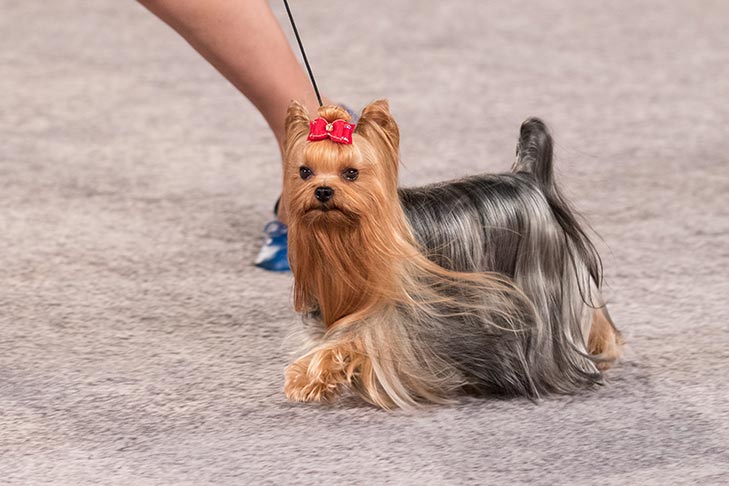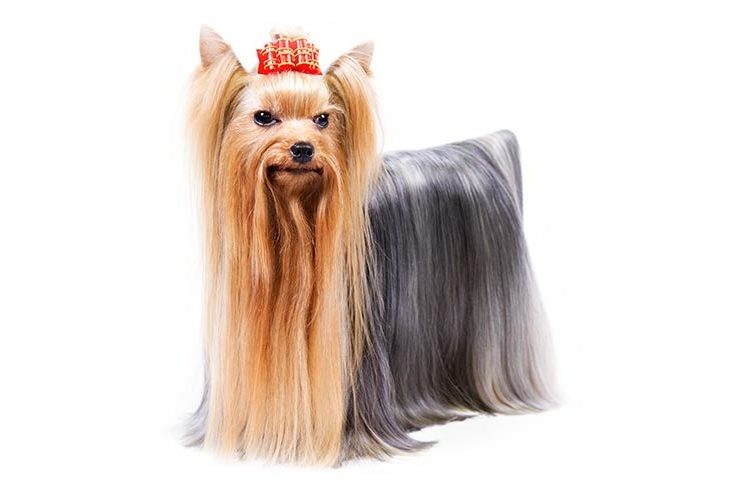Yorkshire Terrier
also known as Yorkie

 History
History
The Yorkshire Terrier, also known as the Yorkie, is a small breed of dog that was developed in the county of Yorkshire, England in the 19th century. It is a popular and beloved breed that is known for its tiny size, long and silky coat, and feisty personality.
The history of the Yorkshire Terrier can be traced back to the Industrial Revolution, when the breed was developed by working-class people in Yorkshire. At the time, the breed was used as a vermin hunter and a ratter, as well as a companion animal. It was created by crossing various terrier breeds, including the Skye Terrier, the Manchester Terrier, and the Maltese. The resulting breed was called the Yorkshire Terrier, and it quickly gained popularity due to its small size and feisty personality.
In the late 19th century, the Yorkshire Terrier was introduced to the United States, where it quickly gained popularity as a fashionable companion animal. It was favored by the rich and famous, and it became a symbol of wealth and status. The breed's popularity continued to grow in the 20th century, and it became one of the most popular breeds in the world.
Today, the Yorkshire Terrier is still a popular and beloved breed that is known for its small size and long, silky coat. It is a popular choice for people who want a small, portable companion animal, and it is also used in obedience trials and as a show dog. Despite its small size, the Yorkshire Terrier is a feisty and courageous breed that is not afraid to take on larger dogs.
The Yorkshire Terrier is a small breed that stands between 7 and 8 inches tall at the shoulder and weighs between 4 and 7 pounds. It has a long, silky coat that is typically blue and tan in color, and it requires regular grooming to maintain its appearance. The breed is generally healthy and has a lifespan of about 12 to 15 years.
Breed Information
Is Yorkshire Terrier a purebred?
Purebred
What were Yorkshire Terriers originally used for?
Small Vermin Hunting
How Long Do Yorkshire Terriers Live? What is average life expectancy for a Yorkshire Terrier? How long can Yorkshire Terriers live?
12-16 years
The average Yorkshire Terrier lifespan is somewhere between 12-16 years, provided they aren't beset by any exceptional health issues or injuries.
Yorkshire Terrier Height & Weight
How big is a full grown Yorkshire Terrier?

| Height | ||||
|---|---|---|---|---|
| Average | 6 months | 12 months | 18 months | |
| Male | 8-9 inches (20.3 - 22.9 cm) | 4.5 inches (11.4 cm) | 7.5 inches (19.1 cm) | 8.5 inches (21.6 cm) |
| Female | 8-9 inches (20.3 - 22.9 cm) | 4.5 inches (11.4 cm) | 7.5 inches (19.1 cm) | 8.5 inches (21.6 cm) |
| Weight | ||||
|---|---|---|---|---|
| Average | 6 months | 12 months | 18 months | |
| Male | 5-7 pounds (2 - 3 kg) | 3.0 pounds (1 kg) | 5.0 pounds (2 kg) | 6.0 pounds (3 kg) |
| Female | 5-7 pounds (2 - 3 kg) | 3.0 pounds (1 kg) | 5.0 pounds (2 kg) | 6.0 pounds (3 kg) |
Do Yorkshire Terriers get fat easily?
![]()
![]()
![]()
![]()
![]()
The Yorkshire Terrier is a dog breed that has a low to average risk for obesity. This means that they are less likely to gain weight than some breeds, but it is still important to monitor their food intake and ensure they get enough exercise to maintain a healthy weight and overall well-being.
Are Yorkshire Terriers Hypoallergenic?
Yes
While no dogs are truly 100% hypoallergenic, Yorkshire Terriers are about as close as it gets, making them an ideal pet if you are an allergy sufferer.
What is a Yorkshire Terrier personality? What are Yorkshire Terrier dogs best known for?
Alert
Energetic
Intelligent
Playful
Courageous
Independent
Loyal
Are Yorkshire Terriers heavy shedders? How Much Does a Yorkshire Terrier Shed?
![]()
![]()
![]()
![]()
![]()
Yorkshire Terrier will shed a negligible amount of hair. Some owners say that they do not shed, but that is not true. But the amount of shedding can be rather light than other dog breeds. If you do not want to deal with the hairs flying around in your home, then this breed is a perfect choice for you.
What is the watchdog ability of a Yorkshire Terrier dog?
![]()
![]()
![]()
![]()
![]()
Yorkshire Terriers are very good watchdogs. They are a vocal breed, and are wary of outsiders, so if someone approaches your home or aims to intrude, the Yorkshire Terrier is going to make sure everyone knows about it.
Breed History
Where do Yorkshire Terriers come from?
England
What are Yorkshire Terriers descended from?
Waterside, Manchester, Paisley, Skye, Dandie Dinmont Terriers
What organizations or kennel clubs recognize/register the Yorkshire Terrier breed?
American Canine Registry
American Kennel Club
America's Pet Registry
Canadian Kennel Club
Dog Registry of America Inc.
Federation Cynologique Internationale
Kennel Club of Great Britain
North American Purebred Registry, Inc.
American Canine Association, Inc.
Australian National Kennel Council
Continental Kennel Club
National Kennel Club
New Zealand Kennel Club
United Kennel Club
When were Yorkshire Terriers first bred? How old is the Yorkshire Terrier breed?
1800s
What Breed Group is a Yorkshire Terrier?
Toy (AKC:1885)
Companion (UKC)

Yorkshire Terrier Appearance
What color are Yorkshire Terrier eyes?
Brown
What color can Yorkshire Terrier nose be naturally?
Black
What color can Yorkshire Terrier coat be naturally?
Black
Blue
Silver
Fawn
How long is a Yorkshire Terriers coat?
![]()
![]()
![]()
![]()
![]()
The coat of a Yorkshire Terrier dog is generally known for its length.
How Dense Is The Yorkshire Terrier Coat?
![]()
![]()
![]()
![]()
![]()
What is the texture of the hair of a Yorkshire Terrier?
Straight
How many puppies can a Yorkshire Terrier have in a litter? How many puppies can a Yorkshire Terrier have in her first litter?
12-16 puppies per pregnancy
A Yorkshire Terrier can have a litter of 12-16 puppies on average. However, it's worth noting that the size of the litters can vary greatly. Factors that can influence litter size include the health of the mother, breeding history, and genetics.
![]()
![]()
![]()
![]()
![]()
Yorkshire Terriers are known for their adaptability and versatility, they are capable of adapting well to a wide range of lifestyle changes and living environments. They are a highly adaptable breed, and make great companions for families and individuals of all lifestyles.

Yorkshire Terrier Health Issues
Do Yorkshire Terriers have a lot of health problems?
![]()
![]()
![]()
![]()
![]()
The Yorkshire Terrier breed is commonly healthy with low vet costs, regular check-ups may not be as necessary but it's important to keep an eye on their health and have them checked by a veterinarian when needed.
What are the major health concerns to be aware of when owning a Yorkshire Terrier?
Portacaval Shunt
Tracheal Collapse
Legg-Calve-Perthes Disease
What are the less significant issues to keep in mind when it comes to Yorkshire Terriers?
Patellar Luxation
Progressive Retinal Atrophy
What are the occasional tests recommended for Yorkshire Terrier breed?
Eye
Knee
Liver Ultrasound
X-Rays
Endoscopy

Yorkshire Terrier Needs and Activities
Do Yorkshire Terriers have a lot of energy?
![]()
![]()
![]()
![]()
![]()
Yorkshire Terriers are high-energy dogs, thus an active lifestyle suits them well.
Do Yorkshire Terriers need socialization? How social are Yorkshire Terriers?
![]()
![]()
![]()
![]()
![]()
Yorkshire Terrier have very high social needs. These needs include regular mental and physical stimulation, a job or purpose, and companionship. They thrive in environments where they have a lot of interaction with humans and other dogs.
How much exercise should Yorkshire Terriers get?
![]()
![]()
![]()
![]()
![]()
The Yorkshire Terrier is a breed that requires minimal physical activity to maintain a healthy lifestyle.
How much sleep should a Yorkshire Terrier have? Do Yorkshire Terriers sleep a lot?
![]()
![]()
![]()
![]()
![]()
Yorkshire Terriers are active dogs that don't require as much sleep as other breeds. However, they still need enough sleep to stay healthy.
Does a Yorkshire Terrier drool a lot?
![]()
![]()
![]()
![]()
![]()
The Yorkshire Terrier is a breed of dog that is characterized by its minimal drooling, making it an ideal choice for people who dislike drool marks on their clothing.
How much does it bark?
![]()
![]()
![]()
![]()
![]()
Yorkshire Terrier dogs bark and howl frequently, they are not a good fit for quiet homes.
Do Yorkshire Terriers exhibit aggressive behavior to safeguard their home and territory? Do they possess a natural tendency to guard?
![]()
![]()
![]()
![]()
![]()
These dogs are known for their strong territorial instinct and protective nature. They will fiercely defend their territory and are highly alert and vigilant against any perceived threat to their home and family.
Are Yorkshire Terriers mouthy?
![]()
![]()
![]()
![]()
![]()
What is the likelihood of a Yorkshire Terrier running away? Do they have a tendency to explore or wander frequently?
![]()
![]()
![]()
![]()
![]()
Do Yorkshire Terrier dogs have a high prey drive?
![]()
![]()
![]()
![]()
![]()
What do Yorkshire Terriers enjoy doing? How do I keep my Yorkshire Terrier busy?
Walk, Play, Walking, Belly rubs, Toys, Fetch, Being held, Napping, People watching, Jump, Run, Lounge, Sniffing, Petting, Resting, Belly action, Sleeping, Running, Eating Snacks, Brushing, Cuddling, Attention, Pets, Barking, Exploring, Marking, Licking, Cuddles, Walkig, Play keep away
What is the energy level of a Yorkshire Terrier? How much energy does a Yorkshire Terrier have?
Medium
Yorkshire Terriers are medium-energy dogs and typically enjoy socializing and playing casual or even sustained games of chase with other dogs. They may also have occasional periods of barking or racing around the house.
![]()
![]()
![]()
![]()
![]()
How far should a Yorkshire Terrier walk each week? How many miles should a Yorkshire Terrier walk every week?
6 miles / week
There's really no limit to how far you walk your dog as long as they're comfortable. For Yorkshire Terrier, it's at least 6 miles / week. Just remember to build distance and stamina gradually over time.
How much a Yorkshire Terrier should exercise a day? How much activity does a Yorkshire Terrier need?
30 minutes
In general most Yorkshire Terriers usually need at least 30 minutes of exercise daily. This can be spread across the day and include all sorts of high-energy activities, like walking, running and playing.
What level of grooming should be provided for a Yorkshire Terrier?
![]()
![]()
![]()
![]()
![]()
This breed is known for having high grooming needs.
How often should you brush a Yorkshire Terrier?
Daily
Ideally, Yorkshire Terrier should be brushed at least 2 or 3 times a week (preferably daily) improve shedding.
What are the most commonly used brushing tools for Yorkshire Terriers?
Pin Brush
Comb
Nail Clipper
Costs
How many cups of food does a Yorkshire Terrier eat?
1 cups
For an average 5-7 pound (2 - 3 kg) Yorkshire Terrier feed 1 cups daily. But, keep in mind, the amount you feed is going to be dependent on the quality of the food you are feeding.
How Much Does a Yorkshire Terrier Cost Daily?
$1.10 - $1.40 / day
The average cost of a Yorkshire Terrier is somewhere $1.10 - $1.40 per day.
How Much Does a Yorkshire Terrier Cost Per Month?
$28 - $42 / month
The average per month expenses of a Yorkshire Terrier is between $28 - $42. This makes an average of $336 - $504 per year. It will be on the higher side when the dog is still small because it will need more frequent visits to the vet, shots.
Yorkshire Terrier Characteristic
How intelligent is a Yorkshire Terrier?
![]()
![]()
![]()
![]()
![]()
The Yorkshire Terrier breed is considered very intelligent and easy to train.
How sensitive is a Yorkshire Terrier dog?
![]()
![]()
![]()
![]()
![]()
This dog breed is particularly attuned to its environment and the emotions of those around it. It can be easily overwhelmed by loud noises, new environments, and unfamiliar people or animals. This dog is best suited for individuals or families who are patient, gentle, and understanding of its sensitive nature. It may also benefit from a calm and stable home environment, with a consistent routine and plenty of positive reinforcement training.
Are Yorkshire Terrier dogs affectionate?
![]()
![]()
![]()
![]()
![]()
Do Yorkshire Terrier do well in apartments? Are Yorkshire Terriers good indoor dogs?
![]()
![]()
![]()
![]()
![]()
Yorkshire Terriers are known for being excellent apartment dogs. They are fairly active indoors and will do okay without a yard.
Are Yorkshire Terriers good with kids? Are Yorkshire Terriers good around children?
![]()
![]()
![]()
![]()
![]()
Yorkshire Terrier dogs are not kid-friendly.
Are Yorkshire Terriers good for elderly?
![]()
![]()
![]()
![]()
![]()
Are Yorkshire Terriers good with cats? How friendly Yorkshire Terriers are toward cats?
![]()
![]()
![]()
![]()
![]()
Yorkshire Terriers are one of the best dogs for cats. They're accept cats readily as part of the family. However, this dog breed should be trained to not chase after the kitty early on
Do Yorkshire Terrier dogs get along with other dogs? Are Yorkshire Terriers OK with other dogs?
![]()
![]()
![]()
![]()
![]()
Yorkshire Terriers are below average dog friendly dogs. Yorkshire Terrier dogs may not always get along well with other dogs they have not been raised with,
How do Yorkshire Terrier dogs interact with other pets? Are they considered pet-friendly?
![]()
![]()
![]()
![]()
![]()
Are Yorkshire Terriers friendly with strangers?
![]()
![]()
![]()
![]()
![]()
Yorkshire Terriers are average friendly around strangers. They can be wary around strangers and a little standoffish. Early socialisation is key.
Do Yorkshire Terriers like to play? Are Yorkshire Terriers playful?
![]()
![]()
![]()
![]()
![]()
Yorkshire Terriers have an average level of playfulness. The Yorkshire Terriers, like other dogs, like to play. But they are not the most playful dog breed.
Are Yorkshire Terrier easily trained?
![]()
![]()
![]()
![]()
![]()
Yorkshire Terrier dogs are usually easy to train, but may require consistency to fully obey commands.
Compare Yorkshire Terrier with other dogs
- Yorkshire Terrier vs American Bull Staffy
- Yorkshire Terrier vs Cavaton
- Yorkshire Terrier vs American Neo Bull
- Yorkshire Terrier vs Carkie
- Yorkshire Terrier vs Australian Boxherd
- Yorkshire Terrier vs Olde English Bulldogge
- Yorkshire Terrier vs Schapso
- Yorkshire Terrier vs Cursset
- Yorkshire Terrier vs Miniboz
- Yorkshire Terrier vs Bologco